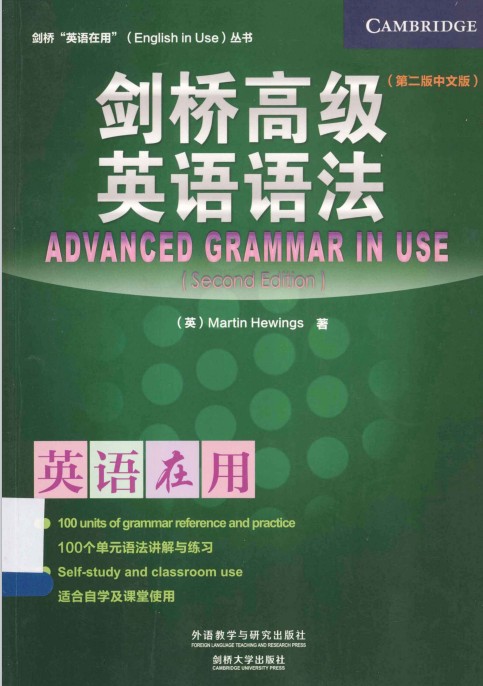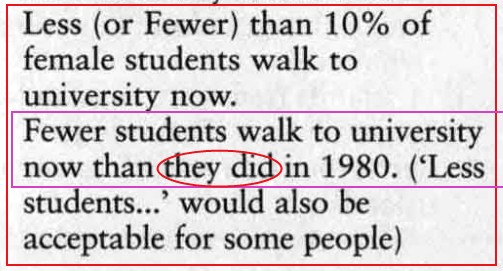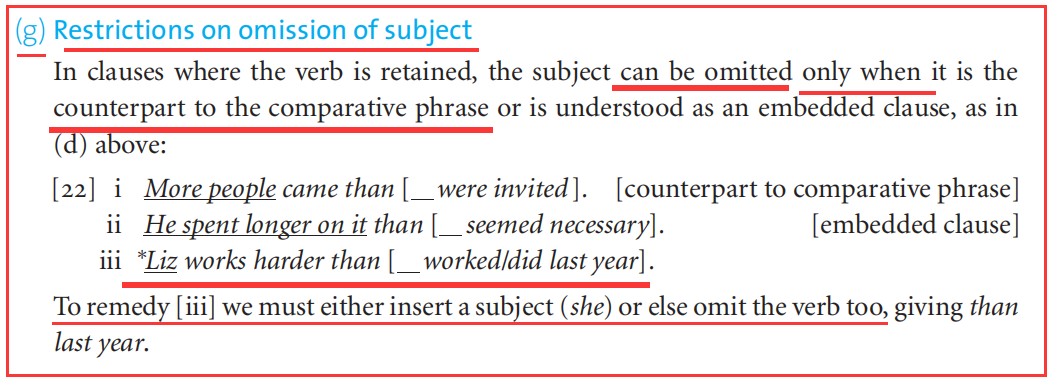已经有老师给出了自己的意见。我补充几点
1.千千学堂的质疑有道理。《剑桥高级英语语法》(第2版)Fewer students walk to university now than they did in 1980这个句子确有不妥。比较项(Fewer students)的对应项在分句中是不应该出现的。因此,我个人觉得比较分句they did in 1980用法不妥。
这种用法在日常口语中可能会被忽视,毕竟说话不周全没必要追究。但在语法教科书似乎不该出现。我们可以看到,在《剑桥高级英语语法》第三版中,该练习答案已经改为Fewer students walk to lectures now than in 1980. 我想或许是作者或编辑意识到了第2版原句用法失当。
2. 通常情况下,比较项的对应项在比较分句中不出现是强制性的的,并非选择性的。而且这个“对应项”并非仅限于做主语。作表语或宾补等也都不能在分句中出现。例如:
(1)Tom is stronger than Bob (is). (不说*Tom is stronger than Bob is strong/stronger.)
(2)You have read more books than I (have done/read). (不说*You have read more books than I have read books/few books)
(3) More people died of flu in 1919 than were killed in the First World War. (不说*More people died of flu in 1919 than they were killed in the First World War.)
3. 上面讲到“通常”比较项的对应项在比较分句中必须空缺。这就是大家比较喜欢引用的Huddleston所说的Counterpart of comparative phrase normally omitted unless distinct.
从Huddleston的论述看,实际就是:如果比较项不同(distinct),那么比较项的对应项就不能空缺。例如:
(4)The swimming-pool is deeper than it is wide. (比较项deeper的对应项wide不能空缺)
(5)She wrote more plays than her husband wrote novels. (比较项more plays的对应项novels不能空缺)
当然,除了Huddleston所讲的上述例外以外,如果要让比较项的对应项出现在比较分句中,那么只能采取“补全”的方式,但这一点既难以准确表达原句意思意,又冗长繁琐,通常被视为非正式或非标准英语。例如:
(6) They sent more vegetables than I had ordered.
(7)They sent more paper than what I had ordered.
第一句是标准英语,但第2句就是非标准英语,尽管有人这样用。
至于直接在分句中用人称代词,这样的用法仅有小范围的可行性,一般都不可以。例如本题讨论的这个句子,如果写成Fewer students walk to university now than they did in 1980,这不可取。因为they指代的就是前文中的名词fewer people,但实际上(现在步行上学和1980年步行上学)两者是完全不同的人,they无法指代前者。句(3)也是这样的问题。很多主语空缺就是这样造成的,因为很难补上空缺部分。这个问题以前有过很多讨论,就不多说了。
4. 至于《剑桥英语语法》2.1 Reduction of comparative clauses一节提到的比较分句的缩略式或省略式,有的是强制性的,有的是选择性的。而(b)Counterpart of comparative phrase normally omitted unless distinct这一小节正好就包含在Huddleston所讲的强制性缩略(obligatory reduction)中,符合我们讨论的“比较项的对应项通常不在分句中出现”这个主题。而可省可不省的是《剑桥英语语法》一书中 (c)-(g)诸小结的内容,已经脱离了“比较项的对应项”这一议题范围。
















